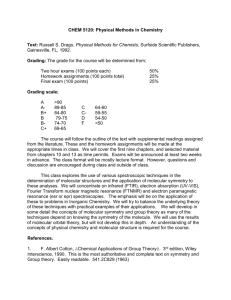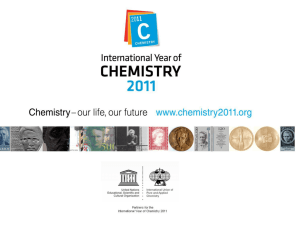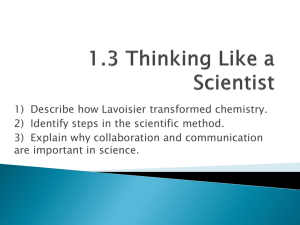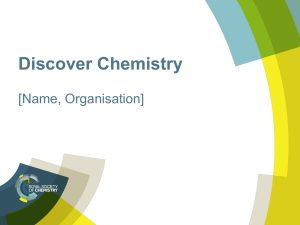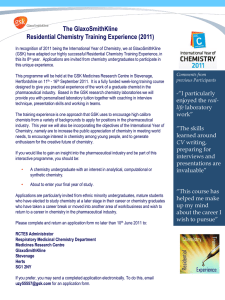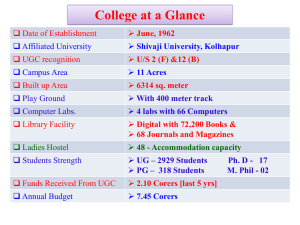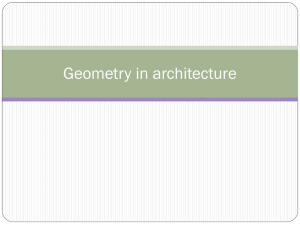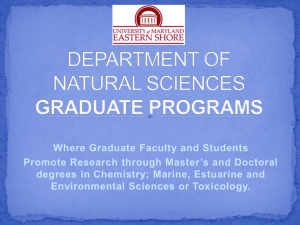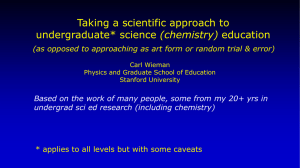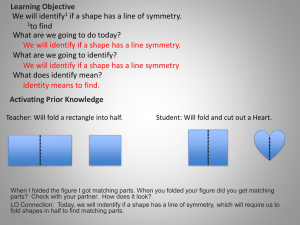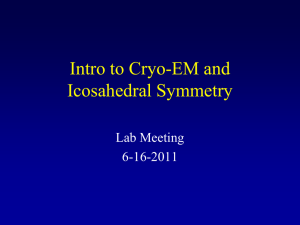CHM xxxx: Part 2 - Department of Chemistry
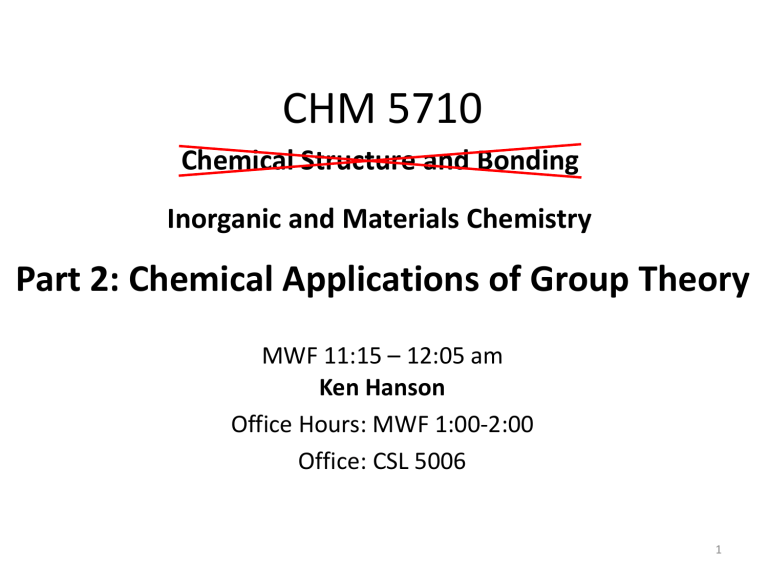
CHM 5710
Chemical Structure and Bonding
Inorganic and Materials Chemistry
Part 2: Chemical Applications of Group Theory
MWF 11:15 – 12:05 am
Ken Hanson
Office Hours: MWF 1:00-2:00
Office: CSL 5006
1
Syllabus Day!
2
Inorganic Chemistry
What are the fundamental concepts in inorganic chemistry?
4
Inorganic Chemistry
Huheey, Keiter and Keiter Inorganic Chemistry, 4 th ed.
Inorganic Chemistry
Huheey, Keiter and Keiter Inorganic Chemistry, 4 th ed.
Inorganic Chemistry (1 st Edition)
“any phase of chemistry of interest to an inorganic chemist.”
-James E. Huheey
7
coordination chemistry metals metal oxides metalloenzymes bioinorganic sol-gel nanoparticles metal-organic frameworks metal ion sensing quantum dots semiconductors ceramics conductive polymers nanotubes graphene
“any phase of chemistry of interest to an inorganic chemist.”
-James E. Huheey
8
Inorganic Chemistry
Miessler and Tarr, Inorganic Chemistry
9
Group Theory
Group theory (chemistry)- The mathematical application of symmetry to an object to obtain knowledge of its physical properties.
10
Symmetry Cliché
Symmetry Through the Eyes of a Chemist
11
Symmetry Cliché
Symmetry Through the Eyes of a Chemist
12
Applications of Symmetry
• Symmetry (group theory) in cryptography
• Symmetry breaking of strong and weak forces in the early universe
• Symmetry (group theory) was used to predicted the existence of many elementary particles before they were found experimentally
• Modern particle physics would not exist without group theory
• X-ray crystallography
• Spectroscopy
• Quasicrystals-Periodic structure that lacks translational symmetry, has only local symmetry. (2011 Nobel Prize in chemistry, Dan Shechtman)
Group Theory
Group theory (chemistry)- The mathematical application of symmetry to an object to obtain knowledge of its physical properties.
Who has heard of group theory?
Who has had Inorganic Chemistry?
Who has covered group theory in Inorganic Chemistry?
14
What could be covered?
Definitions and Theorems of Group
Theory
Symmetry Elements/Operations
Symmetry Classifications
Dipoles
Optical Isomers
Representations of Groups
Irreducible Representations
Molecular Orbital Theory
Symmetry-Adapted Linear Combinations
Projection Operators
Polarizations
Orbital Diagrams
Term Symbols
Expansion coefficients
Crystal Field Theory
Ligand Field Theory
VSEPR
Selection Rules
Vibrational Modes
Infrared Spectroscopy
Raman Spectroscopy
Electronic Spectroscopy
Fluorescence
Phosphorescene
X-ray Crystallography
Space Groups
Lattice Symmetry
3-D Space Groups etc…
15
What will be covered?
1) Intro to Symmetry Elements and Operations
2) Point Groups Types/Assignments
3) Dipole Moments and Chirality
4) Rules that Govern Symmetry
5) Character Tables
6) Using Character Tables
7) Orbital Diagrams
8) Electronic Spectroscopy
9) Vibrational Spectroscopy
-Infrared
-Raman
9) Crystallography (maybe)
16
Course Goals
• Turn you all into group theorists?
• Overview of group theory (in chemistry)
– Learn about the tools that are available
– Learn some of the language
– To appreciate the foundations of current knowledge/technology
• Fill your toolbox
How we teach chemistry Reality
Analytical
Organic
Physical
Inorganic
Biochem
Your answer is here
Analytical
Physical Organic
InorganicBiochem
You are here
17
Disclaimer
When am I going to use this?
Maybe never… at least not directly deriving character tables predicting/interpreting IR orbital diagrams solving structures from IR
DFT calculations
Inorg. Chem. text book
XRD and NMR
But…
Used in crystallography
Tuning ligands
Foundational to our current working knowledge
Build your conceptual framework
If you teach!
Also
Group theory is amazing!
18
Symmetry in Chemistry
Given the following Raman and IR spectra of Fe(CO)
5 and your character tables, is the molecule square pyramidal or trigonal bipyramidal?
CO
OC
OC
Fe
CO
CO
OC or
CO
Fe
CO
CO
CO
Symmetry of Spectroscopy of Molecules by K. Veera Reddy
Symmetry in Chemistry
balloon animals + 200 year old math = structure of Fe(CO)
5
CO
OC CO
Fe
OC CO
OC or
CO
Fe
CO
CO
CO
Group theory is amazing!
Syllabus
Office Hours:
1:00-2:00 MWF
21
Syllabus
22
Optional Texts
23
Infinite Text
24
Syllabus
25
Syllabus
(3 x Assignments)
(5 min presentation)
(2 x Tests)
Test 1 Test 2
Homework 1
Assigned
Due Topic for 5 min presentation Due
Homework 2
Assigned
Due
Homework 3 Due
5 min presentation Due
Syllabus
Due December 1st
• Homework 3
– Edit Wikipedia with something(s) relating to group theory
– Send me a “before and after” of your edits
• Presentation
– Make a 5 minute GeoSet video relating to group theory
– Send me a link to your video
Why the weird homework?
• Generation of new shared content!
• Not “wasted” labor.
General Chemistry:
• ~3,000 4-year colleges in the US 1
• 100 students/semester
• 15 weeks/semester
• 2 semesters/year
• 3 hrs of class + 3 hrs of outside work
• repeat for 50 years
Low end estimate:
2.7 x 10 9 hours
6.75 x 10 7 work weeks (40 hours)
308,219 years
3916 lifetimes (avg = 78.7 years) 2
1) U.S. Department of Education, National Center for Education Statistics. (2013)
2) Organization for Economic Cooperation and Development (OECD)
Why the weird homework?
• Generation of new shared content!
• Not “wasted” labor.
General Chemistry:
2.7 x 10 9 hours
6.75 x 10 7 work weeks (40 hours)
308219 years
3916 lifetimes (avg = 78.7 years) 2
Manhattan Project:
~125,000 people
60 hours/week for 4 years
= 1.56 x 10 9 hours
2260 lifetimes (avg = 78.7 years) 2
Do homework AND contribute content to the online community!
Homework 3: Edit Wikipedia
Presentation GeoSet Video
http://mediasite.oddl.fsu.edu/Mediasite/Play/93aa9659299a495c8d9ed939cc25911f1d
GeoSet Video
http://www.geoset.fsu.edu/
Dirac Library RM 207B
Beware of the Internet
Original Content = Feedback
A Year in the Life of a New Research
Lab…in Less than One Minute Cunningham’s Law- The best way to get the right answer on the Internet is not to ask a question, it's to post the wrong answer.
“People online generally don’t want to be helpful, but they do want to be the smartest person in the ‘room.’” -shammalamala
Beware of the Internet
Develop a thick skin!
It will help you deal with reviews, rejections, qual exam questions, group meetings, etc.
Syllabus
(3 x Assignments)
(5 min presentation)
(2 x Tests)
Test 1 Test 2
Homework 1
Assigned
Due Topic for 5 min presentation Due
Homework 2
Assigned
Due
Homework 3 Due
5 min presentation Due
Why the Camera?
1) Generating new content.
2) Cottrell Scholars Collaborative New Faculty Workshop
Evaluation Study
-Professor Marilyne Stains
-University of Nebraska-Lincoln
-Evaluation of the impact of science education research on instructional practices in higher education
Anyone in witness protection?
How do I teach?
Student Reviews (What should be improved?)
I think the class is great this way but it could be a little bit longer.
Give homework feedback sooner.
Could use more homework/quizzes.
Give more in class questions.
He talks too fast. Need some pause in class.
I’m still wondering what is in the right corner of the room.
Just a weird spot to look at while talking to the class.
This Class
• PowerPoint slides
• Continue with lots of imagery
• Give homework feedback sooner
• More in class questions
• Slow Down
– 2 min break every 10 minutes
• Not stare at the corner?
38
Course Outline
1) Intro to Symmetry Elements and Operations
2) Point Groups Types/Assignments
3) Dipole Moments and Chirality
4) Rules that Govern Symmetry
5) Character Tables
6) Using Character Tables
7) Orbital Diagrams
8) Electronic Spectroscopy
9) Vibrational Spectroscopy
-Infrared
-Raman
9) Crystallography (maybe)
39
